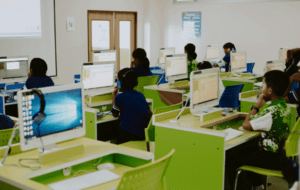By Joana ABBIW
In an era marked by unprecedented change, the nature of work is evolving rapidly. Technological advancements, shifting global economies, and the rising digital landscape are reshaping the skills and competencies that are valuable to industries worldwide.
Ghana, like many emerging economies, stands on the cusp of this transformation, grappling with both challenges and opportunities as it adapts to the demands of the global digital economy. This series explores the multifaceted aspects of the “Future of Work” and addresses the critical skills gap impacting Ghana’s growth trajectory.
Episode 1: Understanding the future of work and Ghana’s role in the global economy
The world of work is transforming, driven by technological breakthroughs, evolving business models, and the ever-growing digital economy. This transformation impacts industries at every level, from small local businesses to global corporations.
In Ghana, these shifts are not only being observed but experienced firsthand. As we navigate these changes, a critical challenge surfaces: the skills gap. Ghana’s workforce needs to be equipped to meet new demands, or risk being left behind in an increasingly competitive world.
In this episode, we delve into what the “future of work” entails and the vital role Ghana could play in the global economy if it successfully navigates these shifts.
What is the “Future of Work”?
The term “future of work” encapsulates the profound changes reshaping today’s industries and workforce. Cutting-edge innovations such as artificial intelligence (AI), machine learning, data science, and cloud computing are at the forefront, transforming traditional job roles and creating new ones that require technical knowledge, adaptability, and creativity.
Many tasks previously performed manually are now automated, and with this automation comes a demand for workers skilled in operating and managing advanced technologies.

However, technology is only part of the story. The future of work also emphasizes a more dynamic, flexible work environment, where collaboration and lifelong learning are paramount.
Employers are looking for professionals who can handle the demands of today’s fast-paced digital landscape and can also adapt and grow as technology continues to evolve.
In Ghana, industries such as finance, telecommunications, manufacturing, and agribusiness are evolving swiftly, each demanding new, advanced skill sets. The question remains: how can our educational and professional training systems rise to meet these demands?
Ghana’s role in the global economy
Ghana stands as a rising force within the African digital economy. With strategic initiatives like the Ghana Beyond Aid agenda, the nation is taking strides towards self-reliance and economic diversification.
In this context, digital skills are no longer just an asset but a necessity. However, a shortage of skilled professionals is stalling progress in many sectors. Without a robust workforce trained in emerging tech skills, Ghana risks missing out on the economic benefits that come with a globalized, digital economy.
While challenges persist, the opportunity for Ghana to establish itself as a leader in technological innovation across Africa and the global stage is substantial. Bridging the skills gap is more than an educational necessity—it’s an economic imperative with direct implications for Ghana’s competitiveness and influence in the global market.
The Skills Gap: Challenge and opportunity
Addressing the skills gap presents a unique opportunity. By investing in skills development, we empower Ghanaians to secure high-quality jobs, build sustainable businesses, and fuel national economic growth. Bridging this gap enhances individual livelihoods while also positioning Ghana as a pioneer in tech and innovation, drawing international attention and investment to its workforce.
This transformation requires a collaborative approach, with educational institutions, government agencies, and private industries working together. Building an ecosystem that fosters continuous learning will ensure that Ghana’s workforce is prepared for the demands of tomorrow’s digital economy.
Looking ahead
In the upcoming episode, we’ll examine the specific skills driving today’s job market. We’ll discuss the most sought-after tech competencies, their importance, and the pathways for Ghanaians to access quality training.
By identifying the steps Ghana can take now, we set the stage for a future where Ghana is recognized as a major player in the global digital economy.










